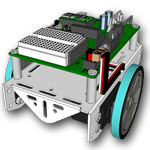Outcomes:
- Explore career options available in technology related fields.
- Assess options for career development/progression and take action on choices.
- Describe potential career choices of interest.
- Describe three of the major fields of robotics (human-robot interface, mobility, manipulation, programming, sensors) and their importance to robotics development.
- Explore and describe youth robotics competitions.
This activity has no robot building assignment. It is time to think about your career options and the next steps you might take in robotics, such as participating in a robotics competition.
View the videos in this section and you will see quite a variety of career choices. Each one presents the education requirements and potential earnings. There are also videos of interviews with technicians, engineers, and managers who tell you what the jobs are like.
Then we encourage you to take one or more aptitude tests to find out what you are really good at. You can find them in school or college counseling offices and job counseling centers and also online. There are no wrong answers in an aptitude test. It simply tells you what your DNA has given you as a set of skills to begin from. Some are great at communication with people, while others prefer to communicate with machines, hard facts and numbers. Some are great at details while others prefer the big picture. Some are athletic while others are not.
A career is most satisfying when you love your work, and that happens when you do work that fits your aptitude. The good news is there are so many opportunities in technology that whatever you are good at, you can have a career related to technology.
The videos provide information about the following careers. Each one provides several different job categories, with more than 50 different jobs described. The education requirements and pay scales start low with the first careers and then increase as the presentation progresses:
- Manufacturing Operators
- Testers and Inspectors
- Technicians
- Support Specialists
- Artists and Drafters
- Engineers
- Programmers
- Designers
- Sales Engineers
- Managers and Business Associates
- Systems Integrators
- Technical Writers
- Trainers and Educators
- Regulatory and Safety Inspectors
- Inventors, Entrepreneurs, and Consultants